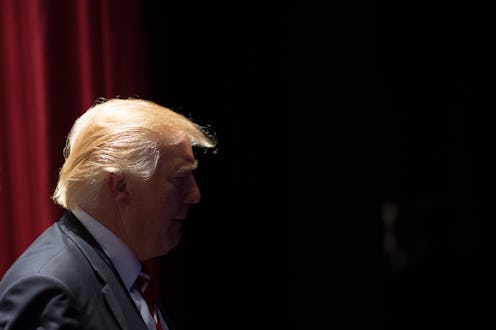News
When Does Trump Have To Pick A Running Mate?
One of the biggest question marks hanging over Donald Trump’s unpredictable, thoroughly surreal presidential campaign is who will emerge as his running mate. When Trump has to choose his vice president, he’ll have something of a tough decision before him, as the presumptive Republican nominee has already alienated some of his strongest potential options. And by when, exactly, does he have to make this choice?
Presidential candidates are formally nominated at their party’s national convention over the summer, and it’s no different for vice presidential candidates. This means Trump doesn’t have to name his running mate until the week of July 18, when the Republican National Convention begins.
In normal cycles, presidential candidates announce their running mates at some point leading up to the convention. Mitt Romney named Paul Ryan as his vice presidential pick on Aug. 11, 2012, and both were formally nominated at the convention two weeks later. But this isn’t a normal presidential cycle, and there’s reason to suspect Trump won’t name a running mate until the convention itself.
This would be anomalous, but the reasoning is simple: Trump is a showman, and waiting until the convention to announce a running mate would automatically turn the event into must-see TV. If nothing else, Trump knows how to get ratings, and it’s hard to think of a better way than this to ensure that the convention attracts the maximum audience possible.
Who he’ll choose is anyone’s guess. But that may not matter: The Republican delegates are the ones who actually vote for and nominate the vice presidential candidate, and according to the Republican Party’s rules, they’re allowed to vote for whomever they want. They don’t have to choose who the party’s presidential candidate wants them to choose, which means that Trump, from a strict technical standpoint, doesn’t get final say over his running mate.
Of course, it usually doesn’t come to this. Delegates are the very definition of the party establishment, and most of the time, the establishment rallies around the nominee and assents to their running mate.
But once again, this is an exceedingly unusual election. The national GOP has not lined up behind Trump in anything resembling a uniform fashion, and if anything, party elders have grown more repulsed by him over the last couple of weeks. While it would be shocking if the party imposed a nominee on Trump against his wishes, that possibility can’t be entirely discounted.
And that’s a good microcosm of how bizarre this election is. Normally, this is the point at which we’d be speculating on who the nominee might choose as their vice president. This year, it’s unclear whether the nominee will even have that choice.
